Puerto Rico Enters Uncharted Waters As Governor Says Commonwealth’s Debts Are Not Payable

Puerto Rico's Gov. Alejandro García Padilla says the U.S. commonwealth is broke and on Monday evening he plans to make a public plea to lower the island’s debt burden. Unlike mainland state and local governments, bankruptcy is not an option for policymakers in San Juan. As a result, Puerto Rico is in uncharted waters as it pushes to restructure its debt in the U.S. municipal bond market. And it’s likely to get messy.
“The governor has pierced the veil and promised that Puerto Rico’s debts will not be repaid in full,” Daniel Hanson, an analyst at Washington-based investment firm Height Securities, said in a research note Monday. “The coming weeks will bring showdowns between the legislature and governor and between the governor and bondholders, and out of the rubble, we expect the PR government to emerge leaner, having shed some debt and restructured some operations.”
García Padilla told the New York Times in a report published Sunday that the commonwealth faces a “death spiral” and that it can’t pay about $72 billion in debt. “This is not politics, this is math,” he said. The governor released on Monday a study of the commonwealth’s financial situation authored by former officials at the World Bank and the International Monetary Fund. The report offers an outline of how the federal government and bondholders might deal with the situation, but it’s light on measures San Juan will need to take to deal with years of financial mismanagement.
For years Puerto Rico has looked to the bond markets to cover expenses amid nearly nine consecutive years of economic contraction, a bloated public sector, and double-digit unemployment. The municipal bankruptcies of Detroit and Stockton, California, in 2013 ended a long-held assumption that local governments always pay back their debts.
Puerto Rico bonds, including ones issued by state-run corporations responsible for services like power, sewage treatment, and roads, have been popular with individual and institutional investors as a safe way to boost returns on securitized municipal debts.
But now the governor is delivering bad news to lenders: Start talking about debt restructuring at a loss and allow the commonwealth some breathing room, or face the prospect of “shooting themselves in the foot,” as the governor describes it, by making the dire financial situation worse and likely lead to loan defaults.
The state power corporation, known by its Spanish acronym Prepa, is working out a deal to avoid a default on a $415 million payment due Wednesday, the start of the new fiscal year. It's part of $1.43 billion in payments that come due Wednesday.
(UPDATE: Puerto Rico paid its June 2015 debt bills on Wednesday, totalling about $1.9 billion. A default has been averted, at least for the time being.)
© Copyright IBTimes 2024. All rights reserved.












